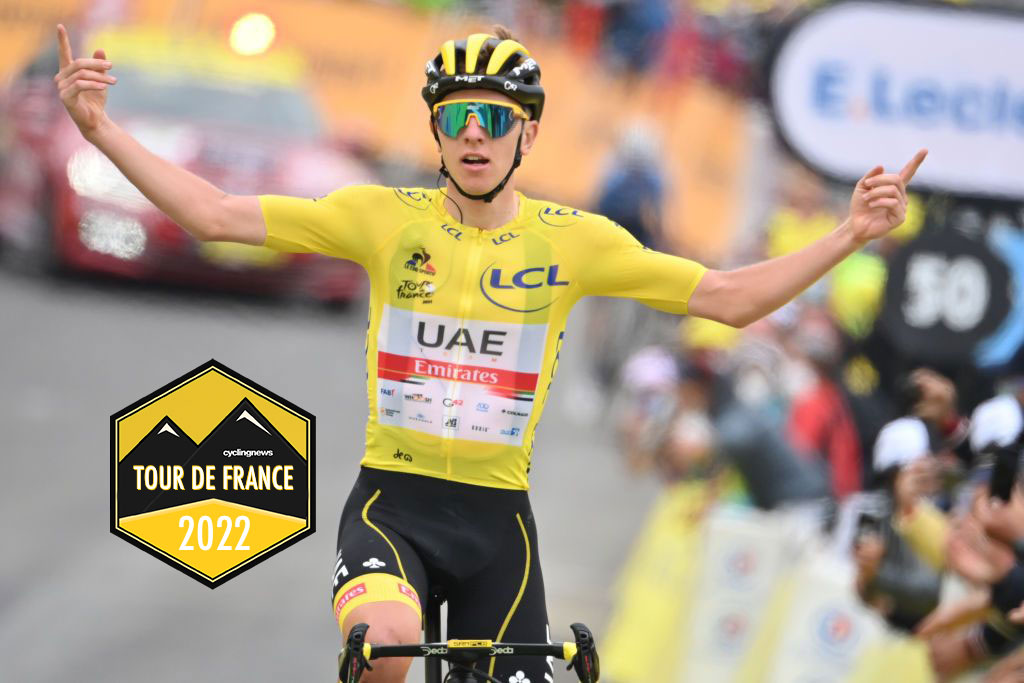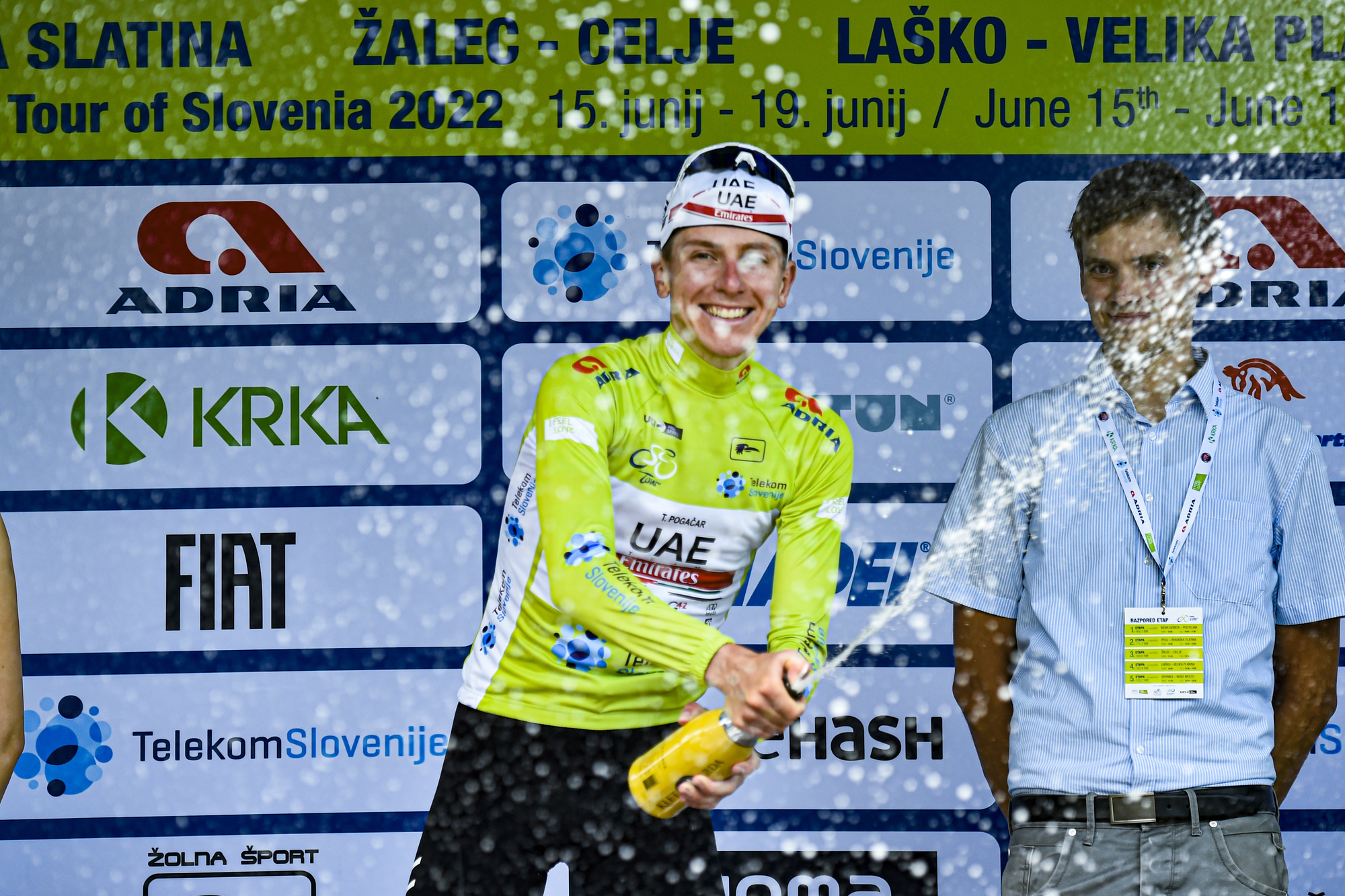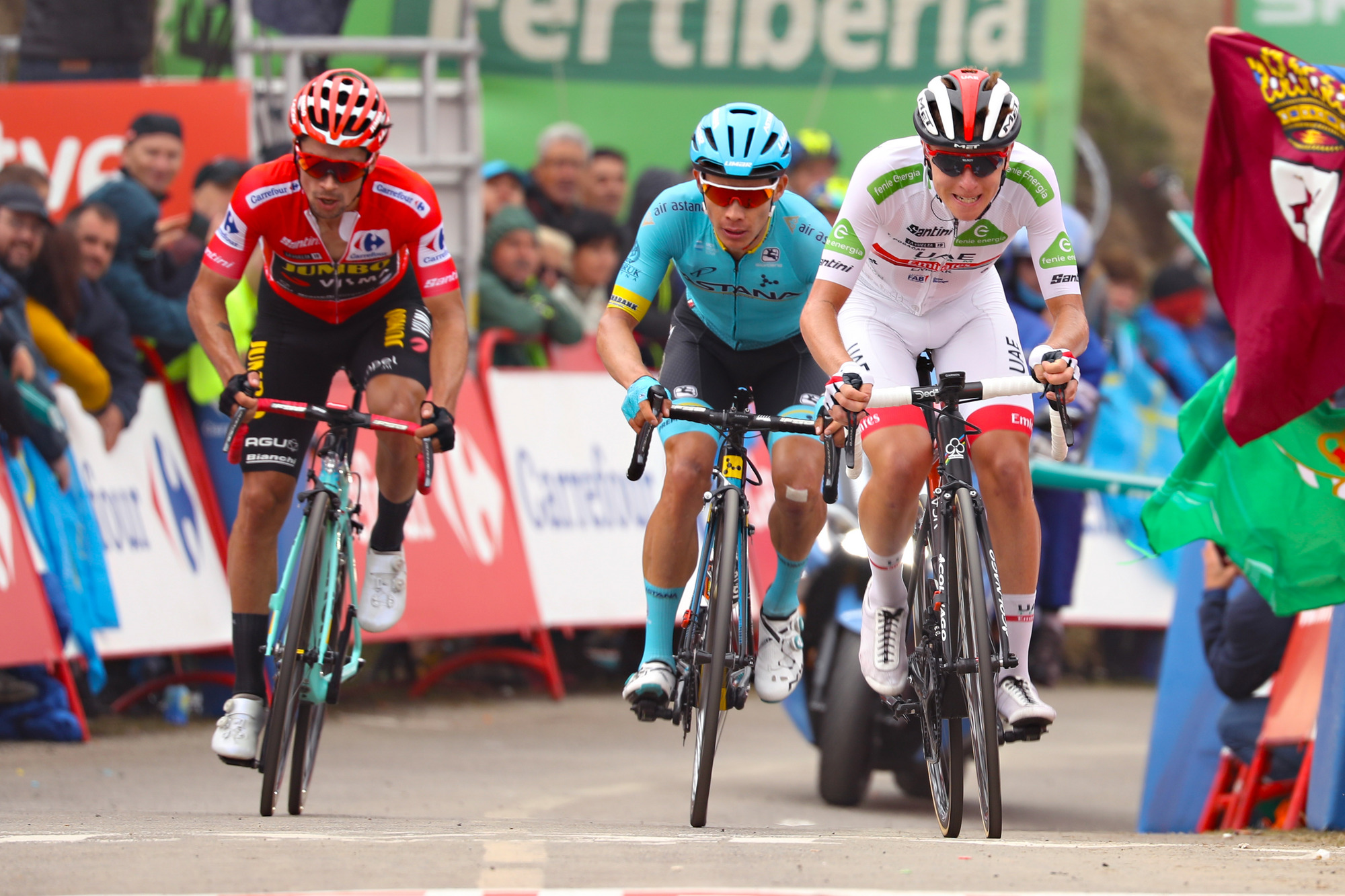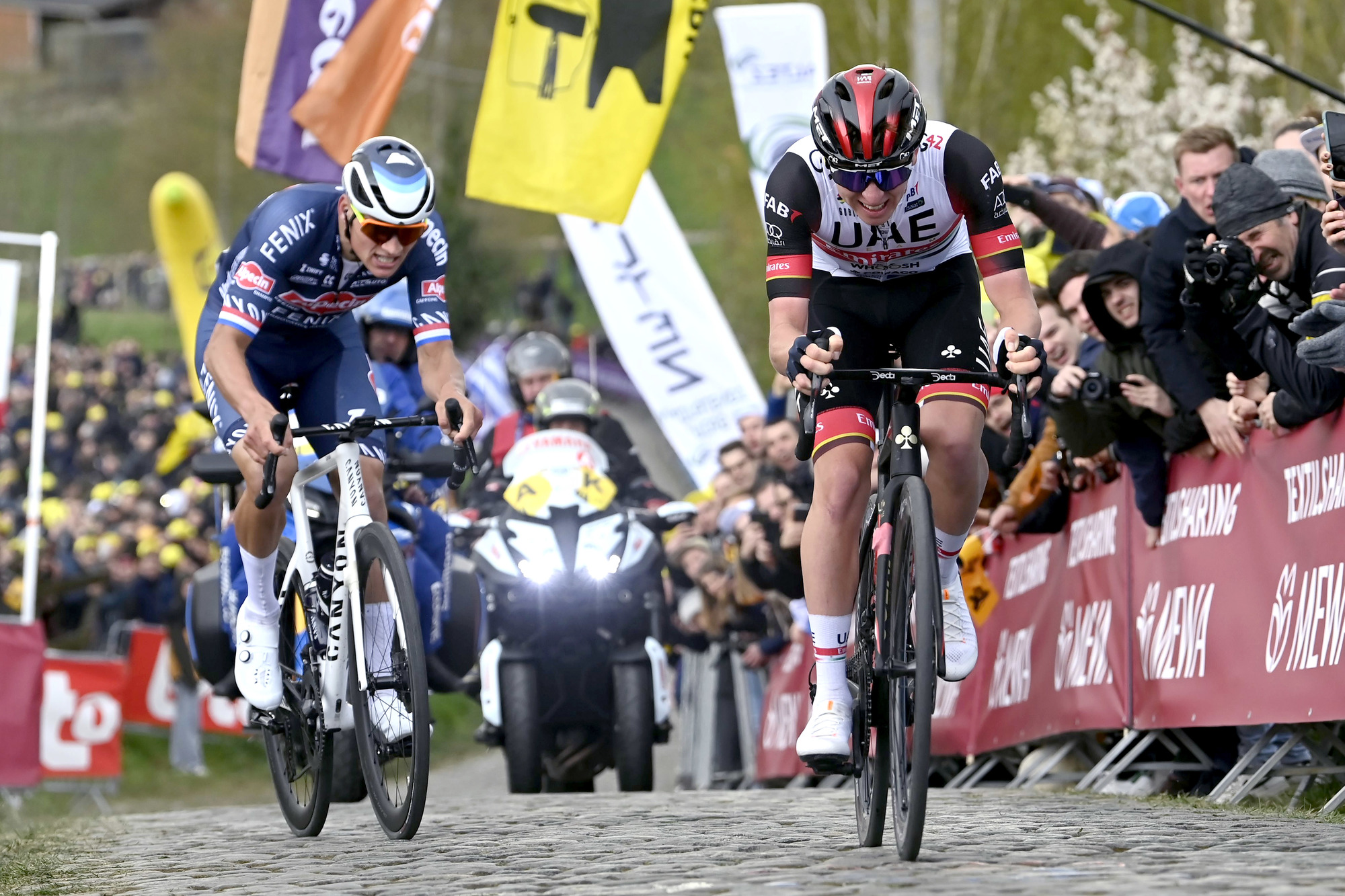Pogacar the pragmatist – Tour de France champion prepared for the worst, inspired by the best
Interview: Defending champion talks about the competition, Roubaix cobbles, Alpe d'Huez, and making history

Looking at the Tour de France contenders and their prospects this week, when it comes to Tadej Pogačar (UAE Team Emirates), it's very hard not to use the words 'dream scenario'.
Pogačar, after all, is double defending champion, the youngest Tour de France winner in 110 years, and has taken the minimum time possible to go from breakthrough triumph to established Grand Tour star status.
He's taken 10 wins so far this season, too, culminating in a repeat victory in the Tour of Slovenia last week that looked even easier than last year's. He has a considerably strengthened line-up of Grand Tour team helpers at UAE Team Emirates, the one area where he was – wrongly, as it happens – perceived as being vulnerable in the Tour last year.
He's 23 years old and has a multi-season contract, so time is very much on his side.
What could possibly go wrong?
Well, according to the man himself, a lot.
That's not, we hasten to add, Pogačar being in any way negative about his current prospects of being the ninth man in history to win three Tours in a row. It's just that when Cyclingnews talks to the Slovenian this summer, he makes it clear he knows full well that just because the Grand Tour tide has been flowing in his favour for the best part of two years now, that doesn't mean circumstances can't or won't turn against him at the drop of a hat, in or out of the race.
Get The Leadout Newsletter
The latest race content, interviews, features, reviews and expert buying guides, direct to your inbox!
"Everyone's expectations are growing about me and also I expect myself to move on at the same pace," Pogačar says in his characteristically matter-of-fact way. "But at one point, probably it'll stop and I need to be prepared for that, also."
"Things can go wrong, but there's nothing wrong with that, that's just life. You do the things you do at 100 per cent. But some things you cannot change, there's nothing you can do. Sometimes you need to accept that something can go wrong."
That kind of pragmatic, feet-on-the-ground attitude has clearly been very effective for Pogačar so far when it comes to winning the Tour de France. It's been less than two years since he poleaxed Primož Roglič just when his fellow Slovenian was on the point of taking home yellow in the 2022, but such has been the scale of Pogačar's domination, in and outside the Tour – he's now on 40 career wins and counting – that it feels like a lot longer.
Asked about how that degree of success has affected him and his racing, Pogačar takes a similarly clear-eyed attitude. Winning has strengthened his hand, he says, but it has also strengthened the opposition's determination to be the one to beat him.
"You get more confidence, the team has more confidence," Pogačar says, "but everybody believes in your chances too which creates more pressure. And a lot of riders start to race against us.
"So it's getting harder and harder every year, but I don't mind this. It's a challenge, because I like to prove myself also."

With consistent success also comes consistently raised expectations, of course, but Pogačar is equally pragmatic about that as well. Rather than getting worked up about the extra stress, he says he's worked out how to turn it to his advantage.
"Yes, sure, for sure every year there's more pressure, it's getting higher and higher, but you can use the pressure to motivate yourself," he reasons.
"If there's no pressure, I will not perform. But it's not a bad thing and it's not like I feel 'if you don't win, you're fired'. It's not that kind of pressure - just something normal."
Staying that level-headed when all around you are calling you the next Eddy Merckx can't be easy, but then again Pogačar has never been one for getting overly precious.
For one thing, he's insisted on staying close to his roots, to the point of starting his own junior bike squad, the Pogi Team, to help promote cycling in Slovenia. Founded last year, the team, he says with a flicker of pride in his voice, "is growing so much now it can hardly get any bigger".
For another, when Pogačar visited Philippe Gilbert's bike shop in Monaco last year, rather than expect special treatment as a Grand Tour winner, the Belgian praised Pogačar for politely standing in line and waiting his turn like the rest of the shoppers.
Pogačar has no illusions that just because he's won the Tour twice, he can jump the queue when it comes to the Tour preparations, either. Apart from a long spell at altitude training in Livigno, Italy, after his curtailed Classics campaign, Pogačar spent two days checking out the Tour's key Alpine stages and two days in the Pyrenees, as well as riding the final time trial in Rocamadour.
It's clearly not as if he's getting overly confident about his chances and skipping the odd July recon just because he's won the Tour twice.
All-in for the Tour
Apart from maintaining that kind of rigorous approach to the Tour de France, it's also notable that Pogačar knows when to draw the line when it comes to managing expectations.
So although it's been announced he'll try to do two Grand Tours this year and probably tackle the Vuelta a España after the Tour de France, he plays down the idea in our interview, saying he may try and target a rainbow jersey in Australia in September instead.
"A lot has happened this year already and we'll see," he said, "I'm more and more interested in the World Championships so nothing is for sure," Pogačar tells Cyclingnews.
"For now the only thing 100 per cent certain is the Tour de France and nothing else."
With that in mind, he says, he has not changed his approach to the Tour at all from previous years. Certainly there's been no attempt to follow Chris Froome's path in 2017, the year the Briton won the Tour and the Vuelta, when Froome deliberately delayed coming into form so he could carry his top condition from France into Spain.
"What happens, happens," Pogačar says. "If I finish the Tour strongly, then I can go to the Vuelta. If I finish badly, then probably not. If it's somewhere in the middle, then we'll see.
"But for now I'm 100 per cent focussed on the Tour and in the days afterwards, we can decide if it's good or not to go."

The route of the Tour de France this year, in any case, is not one where you want to take risks with timing your form. The double-digit length of the opening time trial in Copenhagen, the cobbled stage of the first week, and the extremely difficult, seven-kilometre long summit finish at La Planche des Belles Filles that follows closely afterwards are all key challenges. And then by day nine we're into the Alps.
"My preparation is more or less the same as last year," Pogačar confirms. "Even if there are some flat stages at start, there's still a time trial, you can still get crosswinds so you need to be in good shape and in focus, 100 per cent sharp so nothing bad happens."
While the inclusion of cobbled stages in Grand Tours like those on stage 5 have provoked considerable debate in recent months, Pogaçar is non-committal.
"I honestly don't know," he said, when asked his opinion of cobbled courses in stage races. "Whatever people [fans] want is what's good for cycling, so if people want cobbles, then you need to ride cobbles. If not, then it's useless to have them.
"I did the recon. of this Roubaix stage and I must say, it's one more nervous stage, one more stage where you can lose the Tour but you cannot win it. So from my point of view, it's not the best. But from the point of view of spectators or as a show, it's really good."
Pogačar is less reserved in his judgement about the re-inclusion of the Planche des Belles Filles, the scene of the uphill time trial where he took his first Tour de France back in 2020. But, as practical as ever, he also points out that if he's not feeling great two weeks from Friday, remembering how he took yellow in 2020 in the Vosges will likely not be high on his to-do list.
"If I have good legs for sure it'll bring good memories. It's very different to what it was two years ago, a time trial and not a road race. But it's one of the first really difficult stages of this year's race, and for sure afterwards there'll be a lot of talk about what's happened," he reflected.
Two more potentially decisive talking points of the Tour are the return of Alpe d'Huez and the final time trial. "Probably I have done some harder climbs," said Pogačar, who checked out cycling's most emblematic summit finish last month. "But the first half is super-steep and constant, and on the recon it was 35-37 degrees at the bottom and 30 at the top. With that kind of weather it'll be a stage that tells a lot about the riders.
"And the last time trial is a similar distance to two years ago, 41 kilometres. But this one is a bit more up and down with two small climbs towards the end and on small roads with not very good asphalt. If you don't have a good TT, you could lose the race there for sure."
Making history
As for the last man who did lose the Tour in a time trial, Roglič, Pogačar's compatriot returns to France this summer in very solid form, having just won the Critérium du Dauphiné for the first time. But Pogačar brushes aside the idea that he'll be paying special attention to the man who, in principle, could be his stand-out rival.
"He's one of many people and teams to watch, for sure," Pogačar said. "So far when we raced together, they've always been the toughest races, records were falling... so this is not much different to other years and I'm really looking forward to racing against him."
Yet he underlines again that Roglič won't be the only rival on his internal radar. "There are so many contenders in the Tour, as always, because it's the biggest race. So I won't have eyes only for him. I'll be looking out for all of them."
Yet even if the Tour de France is the top goal for now for Pogačar, his interest and enthusiasm for other races outside the centrepiece of the cycling calendar has brought him much praise and appreciation from fans. In fact, although the plan sounds quite embryonic, Pogačar said he may even avoid the Tour completely at some point in the future, if only for one season.
"I [can] imagine one year with no Tour, but for now it's the main priority," he said.
"Now we go to the Tour again this year and next year we'll see if [I decide] yes or no. But normally – yes."

Pogačar has already shown a degree of diversification that is rare for recent Tour de France champions and for many fans it's a delight to see. They've been no token participations either; in his Tour of Flanders debut this spring, he didn't win, but his palpable annoyance at the way the winning sprint played out – when he finished fourth – was testament to how much he had invested in the race. He also raced Milan-San Remo and finished fifth.
"It was fun, I really love one-day racing," Pogačar says when asked of his memories of the Classics this spring. "They're very different, the atmosphere's great and sometimes it's good to change a bit. I can't always win, but I was surprised at how I went in Flanders and San Remo and it's a challenge for the next years."
Yet for now the challenge is the Tour de France, and Pogačar is looking at possibly becoming the sixth rider in history to win the Tour three years on the trot, following Louison Bobet, Jacques Anquetil, Eddy Merckx, Miguel Indurain, and Chris Froome.
When names like those enter into the equation, it's almost inevitable that you ask Pogačar if he compares himself with other top racers, to which his answer is: "I've cheered more or less for different people, but I've never really had an idol."
But Pogačar does recognise that the historical aspect of his success is impossible to avoid completely, and that it matters.
"I'm here to race, and enjoy the moment," he said, "But for sure, making an impact on history gives you some motivation, some sort of a boost."
Pogačar is aware, then, that even at 23, he's already close to rubbing shoulders with some very elite names among the cycling greats. And that could happen this summer. Still, he's clearly not taking anything for granted and his top priority is taking pleasure from the sport.
For now he's still living the dream scenario and it's not at all easy to see who could stop him.
Alasdair Fotheringham has been reporting on cycling since 1991. He has covered every Tour de France since 1992 bar one, as well as numerous other bike races of all shapes and sizes, ranging from the Olympic Games in 2008 to the now sadly defunct Subida a Urkiola hill climb in Spain. As well as working for Cyclingnews, he has also written for The Independent, The Guardian, ProCycling, The Express and Reuters.
